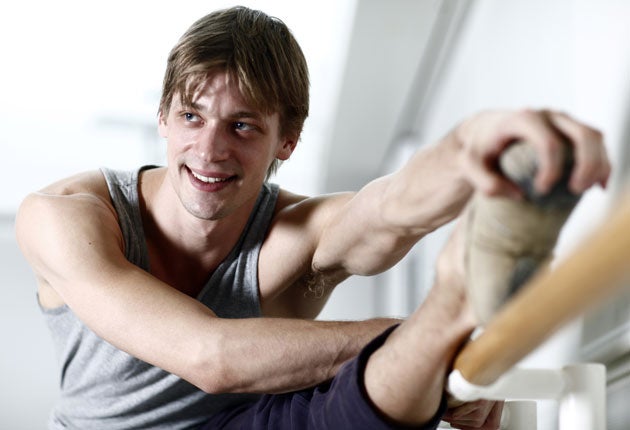Romeo's grand jeté into the ballet limelight
The chance to step into Carlos Acosta's shoes last week was a dream come true, Rupert Pennefather tells Susie Mesure

Getting chucked out of one ballet school seems careless; two and you might start to wonder if you should do something else. Or so you'd think. Not so Rupert Pennefather, the young British ballet star who last week proved perseverance pays off when he stepped in to fill ballet's most famous shoes after injury forced Carlos Acosta, the Cuban dance legend, to pull out of dancing Romeo at the Royal Opera House.
Never had the stakes been higher for the young Pennefather, who at 28 is five years the junior of the only other male British principal at the Royal Ballet, Edward Watson. More than 2,000 people had turned up at no small personal cost to watch Acosta partner Tamara Rojo in Romeo and Juliet, one of the company's most popular ballets. And Pennefather knew many wouldn't be thrilled by the switch of male leads.
"When everyone's expecting to see Carlos... then I come out – it's a very difficult one because he's world class and Romeo is one he dances with Tamara so well. I'm sure some people were disappointed," Pennefather tells me. He confesses he found last Tuesday night "one of the most nerve-racking" performances of his life, up there with partnering Darcey Bussell for the first time.
When we meet at the Opera House, three days after opening night, he says his body is still recovering from the ordeal that is one of Sir Kenneth MacMillan's ballets. His back, in particular, needs help. "If I seem sleepy, it's because I have just had a massage," he tells me. Pain aside, the chance to stand in for Acosta was a dream for the principal, not least because "anytime you dance with Tamara is just incredible; she's the master of the dramatic roles, especially Juliet".
It also sealed his status as Britain's hottest dance talent and helped to boost the profile of one of only three Britons among the Royal Ballet's 19 principals. Along with Lauren Cuthbertson, Pennefather and Watson fly the flag for home-grown dancers in a field many think is overcrowded with foreign names.
Pennefather, who is wearing his rehearsal uniform of double tracksuit bottoms, tight grey shorts, grey singlet, big navy cardigan and, of course, battered ballet shoes, admits he thinks the lack of big British names is a shame. "It's a touchy subject, but I personally think it would be nice to have more English dancers." He pauses, picking his words carefully: "But I don't want to sound racist." He doesn't see a lack of ability; rather a lack of opportunity. "There are some really good dancers who have come from the [Royal Ballet] school but I don't think they necessarily come here. In the Royal Ballet, you have to be quite experienced before you go on stage. Some students are scared they'll sit around and not get the opportunities. Your career is very short; you have maybe 20 years as a dancer."
If Pennefather was lucky to dance some big roles early on, he also worked for his breaks – like asking Sylvie Guillem, ballet's notoriously haughty grande dame, if he could play Paris to her Juliet some years back. Then there was his doggedness in sticking with ballet – even after he ran out of dance schools as a teenager. Not because he was too good for them, but because they kept chucking him out.
First he was "assessed out" – read expelled – from White Lodge, the Royal Ballet's Lower School for pupils aged 11 to 16, only later to suffer the same fate at Tring Park, the Hertfordshire performing arts school. "I'm dyslexic, so when it came to the academic lessons I was maybe a little bit disruptive in class," he admits sheepishly.
He didn't even let a spell in his local Maidenhead comprehensive aged 13 put him off, despite getting bullied. "Going to a comp was not good because the boys in the school [pause], people [pause], don't like someone who is doing something different like dancing, so there was bullying." In the end, he told his parents: "Look, I have to get out of this school or stop dancing." In the end it took private lessons to get Pennefather to the Royal Ballet's Upper School in Covent Garden. Not to mention supportive parents.
It is his twin sister, though, to whom Pennefather ultimately owes his career. He only began dancing because she was taking ballet lessons and he joined in. (She is now a dive instructor in Thailand, which her brother thinks is a "much better job".)
Pennefather isn't the only dogged male ballet dancer out there. Even in today's dance-obsessed age, it takes perseverance for a teenage boy to stick with ballet. "In England there's definitely a sense that ballet is not for men. Although I think all the dance programmes are helping – it's amazing to see how many people out there want to dance – the majority do break-dancing and hip hop and that kind of cooler dancing. There's only a few who do ballet. I don't think kids will ever get over what ballet is; that it's a bit girly."
Perhaps aspiring Billy Elliots should take a leaf out of Acosta's book: his dad told him to hit anyone who teased him. And given the size of the biceps it seems you need to be good – I'm going by Pennefather's in that grey singlet – I'd say bullies should watch out.
Join our commenting forum
Join thought-provoking conversations, follow other Independent readers and see their replies
Comments
Bookmark popover
Removed from bookmarks